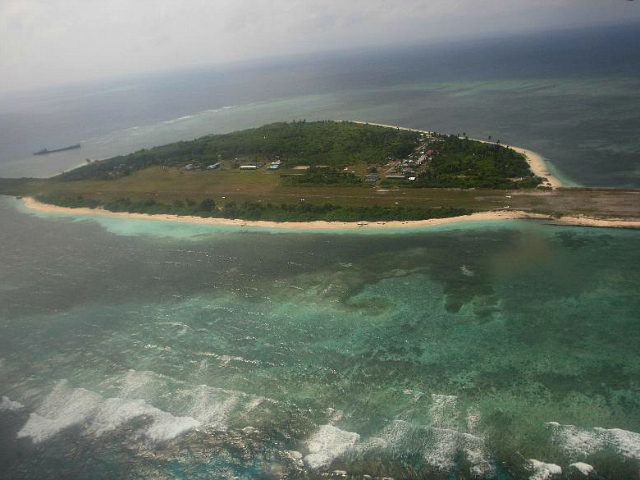The Chinese government has condemned a U.S. Freedom of Navigation Operation (FONOP) conducted near the disputed Mischief Reef in the Spratly Islands, the first such operation under President Donald Trump.
China claims nearly the entire South China Sea, citing vague “ancient” claims to the region. The Permanent Court of Arbitration at the Hague ruled last July against all of China’s claims, asserting that most of the “Chinese” South China Sea is legally international maritime territory.
China claims land and sea belonging to Brunei, Taiwan, the Philippines, Vietnam, Malaysia, and waters off of Indonesia’s Natuna island.
On Wednesday, the U.S. Navy dispatched the USS Dewey to sail within 12 nautical miles of the artificial island China has built upon Mischief Reef, which the Hague ruled was Philippine territory. The United Nations Convention on the Law of the Sea (UNCLOS) places the limit of sovereign waters at 12 nautical miles from the land in question.
“We operate in accordance with international law. We fly, sail, and operate wherever international law allows,” Pentagon spokesperson, Capt. Jeff Davis, told CNN confirming the operation. “We operate in the Asia-Pacific region on a daily basis, including in the South China Sea.”
The operation is the first of its kind since October 2016. The Obama administration used U.S. Navy ships on multiple occasions to assert the international status of South China Sea waters, which China denies. A Breitbart News report revealed in March that the Navy had requested permission for several FONOPs since President Trump took office but had not received the go-ahead to execute them. At the time, Secretary of Defense James Mattis was the only Trump-appointed official at the Pentagon filling the positions that the president has the authority to propose officials for, triggering speculation that the delay in approving FONOPs was a product of understaffing at the Pentagon.
The U.S. government did recently conduct a joint operation with Japan in the region. The Japan Maritime Self-Defense Force (JMSDF) accompanied U.S. Navy ships on May 18 for a passing exercise (PASSEX) in the region, which the Navy said in a statement “included personnel exchanges, cross-deck flight operations, communications exercises, division tactics, a tracking exercise and photo exercise.” While Japan does not assert any territorial claims in the region, the South China Sea’s $5 billion trade corridor plays a pivotal role in its economy.
Chinese media had announced that the People’s Liberation Army (PLA) had installed new “anti-frogman” rocket launchers on Fiery Cross Reef, another usurped South China Sea territory, that same week.
The Chinese Foreign Ministry responded to the FONOP with its customary outrage. “The USS Dewey illegally entered the waters near the island on early Thursday without permission of the Chinese government. Such moves have undermined China’s sovereignty and security, and were very likely to cause unexpected air and sea accidents,” spokesman Lu Kang told reporters, according to the state-run news outlet Xinhua. Xinhua claims the Chinese navy “expelled” the USS Dewey, without elaborating.
Kang went on to assert that China “has indisputable sovereignty of the Nansha Islands and its adjacent waters,” stating, “We firmly oppose any country damaging China’s sovereignty and security in the name of navigation and overflight freedom.”
The state-run newspaper Global Times also ran comments from “Chinese military strategists,” calling the FONOP a “serious strategic mistake.”
The Chinese government had announced a new program to modernize its navy to much fanfare on Wednesday, shortly before the FONOP. President Xi Jinping visited the headquarters of the PLA Navy on Wednesday and “asked naval authorities to build a world-class force by promoting political awareness, reforms and rule of law,” according to Xinhua, as well as condemning Navy officials previously arrested for corruption. The Pentagon has not indicated whether the timing of the FONOP was meant to coincide with Xi’s grand gesture towards his navy.

COMMENTS
Please let us know if you're having issues with commenting.